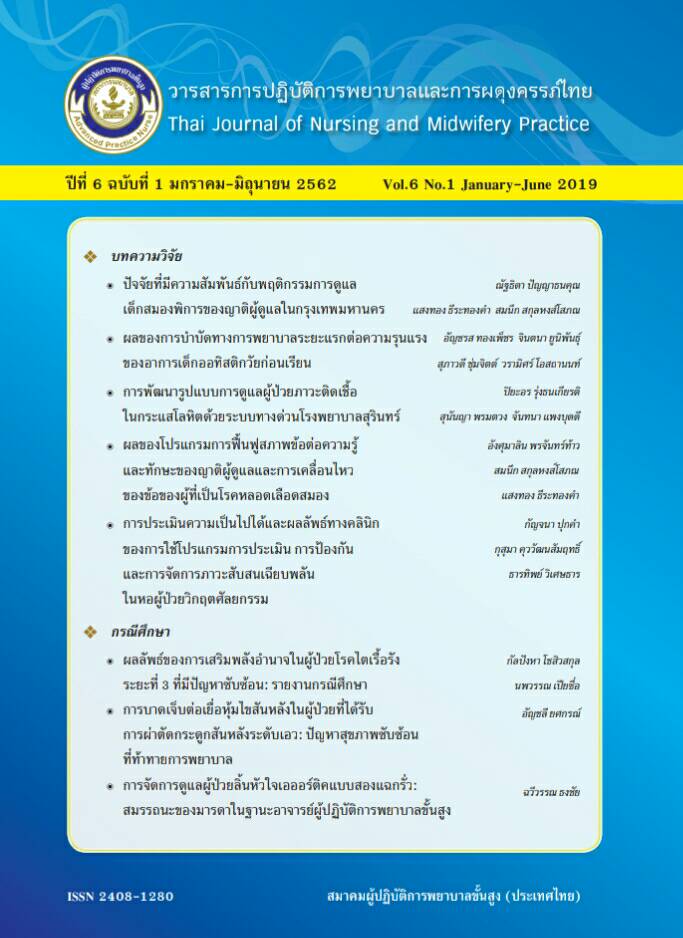Evaluating the Feasibility and Clinical Outcome for Assessment Prevention and Management of Acute Delirium in a Surgical Intensive Care Unit
Main Article Content
Abstract
Abstract: This operation study aimed to study the practical feasibility and outcome for assessment prevention and management of acute delirium in a surgical intensive care unit of Maharaj Nakhon Si Thammarat Hospital. The sample comprised of 2 groups: 21 nurses caring for critically ill patients; and 62 surgical critically ill patients. The study was conducted during February – September 2018. The research instruments were: personal data and illness data records, the evaluation form of practical feasibility, the knowledge assessment on acute delirium, the assessment of nursing process, the assessment of pain, agitation and acute delirium, and procedure manual based on ABCDEF program. Results showed that nurses’ knowledge after program implementation for 1 month was significantly higher than before program implementation (p < .05) which was higher than the targeted outcome (>70%). Of 90.47% of the nurses agreed that the program was feasible in practice. The process of ABCDEF program, patients received complete process on three activities ranged from 79.03-100%. The outcomes after program implementing indicated that most of patients reported low level of pain score. Agitation scores from Day 1 to 7 were increased toward the targeted scores ranged from 65.05% to 75.36%. It was found that 41.93% of patients had acute delirium which consisted of hyperactive, mixed subtype and hypoactive types at the percentages of 22.58%, 16.13%, and 3.22% respectively. The acute delirium was mostly found within Day 1 to 3, at the percentage of 61.54%. This program has the feasibility to implement in critically ill patients. It helps increase nurses’ knowledge in care and patients’ outcomes.
Downloads
Article Details
References
2. Oh ES, Fong TG, Hshieh TT, Inouye SK. Delirium in older persons advanced in diagnosis and treatment. American Medical Association 2017;318 (12):1161-74.
3. Van den BM, Schoonhoven L, Van der Hoeven JG, Van AT, Pickkers P. Incidence and short term consequences of delirium in critically ill patients: A prospective observational cohort study. International Journal of nursing study 2011;49(2012):775-83.
4. Ouimet S, Kavanagh BP, Gottfried SB, Skrobik Y. Incidence, risk factors and consequences of ICU delirium. Intensive Care Medicine 2007;33:66–73.
5. Joseph BH, Nikhil P. Delirium in the Neuro Intensive Care Unit. Critical Care Nurse 2016;28:21-35.
6. Information center. Surgical critical care statistics of Maharaj Nakhon Si Thammarat Hospital. Nakhon Si Thammarat: Maharaj Nakhon Si Thammarat Hospital;2016.(In Thai)
7. Barr J,Gilles LF, Kathleen PE, Wesley E, Celine G, Joseph FD. et al. Clinical practice guidelines for the management of pain agitation and delirium in adult patients in the intensive care unit: Executive summary Am J Health-Syst Pharm 2013;70:53-8.
8. Heymann A, Radtke F, Schiemann A. Delayed treatment of delirium increases mortality rate in intensive care unit patients. Journal of Intensive Medicine Respiratory 2010;38:1584–95.
9. Pisani MA, Kong SY, Kasl SV, Murphy TE, Araujo KL, VanNess PH. Days of delirium are associated with 1-year mortality in an older intensive care unit population. Journal of Respiratory Critical Care Medicine 2009; 180:1092–97.
10. Uppanisakorn S, Seangnhern U, Intaraksa P, Chinnawong T. Factor related to the knowledge about delirium in critical ill patients among nurse.Thai journal of critical care medicine 2010;17;2:6-12.(In Thai)
11. Glynn L, Corry M. Intensive care nurses’ opinions and current practice in relation to delirium in the intensive care setting. Intensive and Critical Care Nursing 2015;31:269-75.
12. Sarah BB, Maeve CL, Peter PY, Jame JS, Anne CM. Delirium prevention program in the surgical intensive care unit improved the outcomes of older adults. Journal of surgical research 2014;190:280-8.
13. Trogric Z, Jagt MV, Bakker J, Balass MC, Ely EW, Voort PH, Ista E. A systematic review of implementation strategies for assessment prevention and management of ICU delirium and their effect on clinical outcomes. Journal of Critical care 2015;19(157):1-17.
14. Balas MC, et al. Adapting the ABCDEF bundle to meet the needs of patients requiring prolonged mechanical ventilation in the long-term acute care hospital setting: Historical perspectives and practical implications. Semin Respir Crit Care Med 2016;37(1):119–135.
15. Donabedian, A. An Introduction to quality assurance in health care. Oxford: Oxford University Press; 2003.
16. Tananuchittikul Y. Application of APACHE II scores in the General Intensive Care Unit, Lampang Hospital. Journal of Health Science 2014;23 (2):298-304.
17. Bansuparb R. Development of clinical practice guideline for traumatic wound management in the emergency room, Lee Hospital, Lamphun Province. Master of Nursing Science (Adult Nursing) Chiang Mai University 2551. (In Thai)
18. Floyd D, Walker P, Vanderveen T, Lewis S, Diring D, Januszewic L, et al. ICU Sedation Guideline of care. San Diego Patient Safety Council 2009:1-44.
19. Lumyong T, Jitpanya C. Factors related to delirium in ICU patients with mechanical ventilators. Thai Journal of Cardio Thoracic Nursing 2012;23 (1):19-30. (In Thai)
20. Morandi A, Myatra SN, Azoulay E, Fagoni N, Inoue S, Kotfis K, et al. Worldwide Survey of the“Assessing pain, Both spontaneous awakening and breathing trials, Choice of drugs, Delirium monitoring/ management, Early exercise/mobility and Family empowerment”(ABCDEF) Bundle. Critical Care Medicine 2017;45(11): 1111-21.
21. Hollinger A, Siegemund M, Goettel N, Steiner LA. Postoperative delirium in cardiac surgery: An Unavoidable menace? Journal of Cardiothoracic and Vascular Anesthesia 2015;29(6),1677-87. 22. Hipp DM, Ely EW. Pharmacological and nonpharmacological management of delirium in critically ill patients. Neurotherapeutics 2012;9: 158–175.
22. Hipp DM, Ely EW. Pharmacological and nonpharmacological management of delirium in critically ill patients. Neurotherapeutics 2012;9:158–175.


